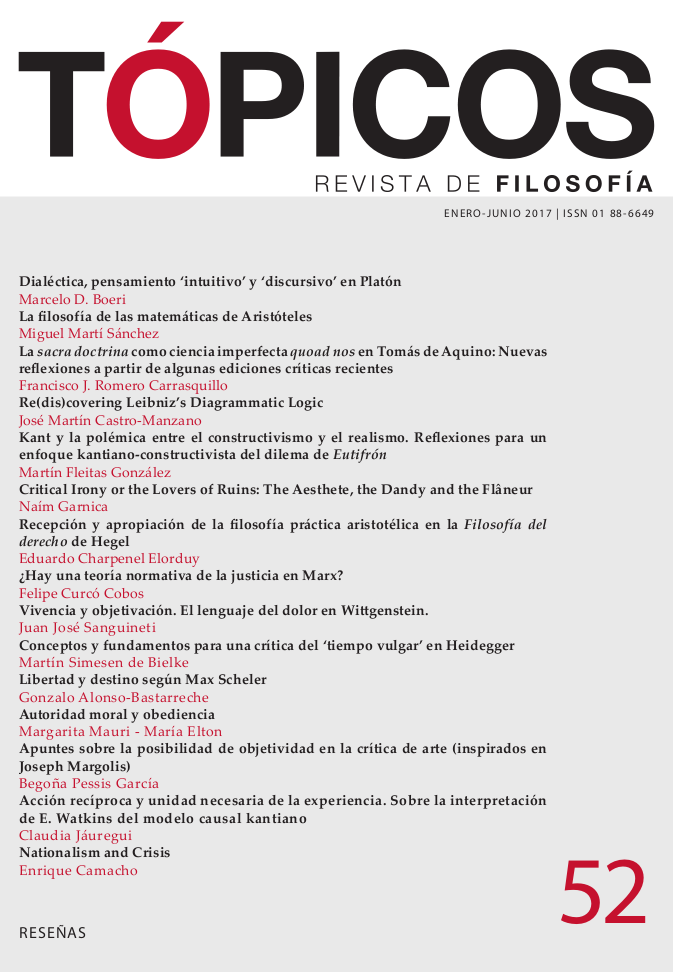Publicado 2016-12-27
Palabras clave
- nacionalismo,
- justicia distributiva,
- legitimidad,
- auto-determinación política,
- derechos de las minorías
- derechos de las mayorías ...Más
Cómo citar
Resumen
Parece que el nacionalismo es una ideología persistente en la academia y en la política a pesar de que parece profundamente injusto para las minorías. El caso de la identidad nacional es frecuentemente defendido para complementar al liberalismo con respecto a los problemas internos que tienen las teorías liberales para explicar la membresía, asegurar la estabilidad y producir el apoyo. Por ello, parece que la justicia requiere el apoyo a la identidad nacional. Mientras que esta controversia puede continuar, yo argumento que existe una aproximación alternativa. Podemos definit una concepción de legitimidad independiente de una concepción de justicia y después preguntarnos qué requiere la legitimidad de nuestras lealtades nacionales. Si todo sale bien, mucho de la controversia desde la justicia desaparece mientras nos encontramos con que el caso en favor del nacionalismo cultural puede ser ilegítimo para las democracias liberales.
Descargas
Referencias
- Abizadeh, Arash, (2002). Does Liberal Democracy Presuppose a Cultural Nation? Four Arguments. American Political Science Review 93(3): 495-509.
- Anderson, Benedict, (2006). Imagined communities: Reflections on the origin and spread of nationalism. London, Verso Books.
- Buchanan, Allen, (2003). Justice, Legitimacy, and Self-Determination. Oxford: Oxford University Press.
- Christiano, Thomas. (2008). The Constitution of Equality: Democratic Authority and its Limits. Oxford: Oxford University Press.
- Dworkin, Ronald, (1986). Law’s Empire. The Belknap Press Harvard University Press.
- _____________, (2001). A matter of Principle. Oxford, Oxford University Press.
- _____________, (2011). Justice for Hedgehogs. Massachusetts, Harvard University Press,
- Estlund, David, (2008). Democracy and Authority. Princeton: Princeton University Press.
- Gans, Chaim, (1998). Nationalism and Immigration. Ethical Theory and Moral Practice, 1: 159-180.
- Gracia, J. J. (2005). Surviving Race, Ethnicity, and Nationality: A Challenge for the 21st Century. Oxford: Rowman & Littlefield Publishers.
- Gellner, Ernest, (1983). Nations and Nationalism. Oxford, Blackwell
- Habermas, J. (1994). Three normative models of democracy. In Democracy and difference: Contesting the Boundaries of the Political. Benhabib, S. (ed). (21-30). New Jersey: Princeton University Press.
- Hobsbawm, Eric, (1990). Nations and nationalism since 1970: Programme Myth and Reality. Cambridge: Cambridge University Press.
- Ingatieff, Michael. (1994). Blood and Belonging: Journeys into the new Nationalism. Lindon: Vintage.
- Kolodny, N., (2014). Rule Over None II: Social Equality and the Justification of Democracy. Philosophy & Public Affairs, 42(4): 287-336.
- Lægaar, Sune, (2006). Feasibility and Stability in Normative Political Philosophy: The Case of Liberal Nationalism. Ethical Theory and Moral Practice 9(4): 399-416.
- Lippert-Rasmussen, Kasper, (2009). Responsible Nations: Miller on National Responsibility. Ethics & Global Politics. 2(2): 109-130.
- Margalit, A. and Raz, J., (2008). National Self-Determination. The Global Justice Reader. ed. Brooks, Oxford: Blackwell: 77-93.
- Mason, Andrew, (1999). Political Community, Liberal-Nationalism and the Ethics of Assimilation, Ethics 109(2): 261-286.
- Miller, David, (1995). On Nationality. Oxford, Clarendon Press.
- __________, (2005). Immigration: The Case of Limits. Contemporary Debates of Applied Ethics. ed. Cohen, A. and Wellman, C, Oxford, Wiley-Blackwell.
- __________, (2008). Immigrants, Nations and Citizenship. The Journal of Political Philosophy 16(4): 171-390.
- __________, (2009). Justice and Boundaries. Politics Philosophy and Economics, 8(3): 291-309.
- __________, (2015). Justice in immigration. European Journal of Political Theory, 14(4): 391-408.
- Norman, Wayne & Kymlicka, Will; (2005). Citizenship. A Companion to Applied Ethics, ed. Frey, R.G., & Wellman, C.H. Malden, Blackwell: 210-223.
- Özkirimli, Umut, (2000). Theories of Nationalism. A critical Introduction. New York, Palgrave.
- Rawls, John, (1971). Theory of Justice, Harvard, Belknap.
- __________, (2000). Political liberalism. New York, Columbia University Press.
- __________, (2001). Justice as fairness a restatement. Harvard, Belknap.
- Rossi, E. (2014). Legitimacy and Consensus in Rawls' Political Liberalism. Iride, 27(1): 37-56.
- Sleat, M. (2015). Justice and Legitimacy in Contemporary Liberal Thought. Social theory and practice, 41(2): 230-252.
- Simmons, A. J. (2001). On the territorial rights of states. Nous, 35(s1), 300-326.
- Song, E. (2012). Rawls's liberal principle of legitimacy. In The Philosophical Forum, 43(2): 153-173). Blackwell Publishing Inc.
- Raz, Joseph, (1998). Multiculturalism. Ratio Juris 11 (3):193-205.
- Tamir, Yael, (1993). Liberal Nationalism. Princeton, Princeton University Press.
- Valentini, Laura, (2012). Assessing the Global Order: Justice, Legitimacy, or Political Justice? Critical Review of International Social and Political Philosophy, 15(5): 593-612.
- Whelan, F. G., (1983). Prologue: Democratic theory and the boundary problem. Nomos, 25: 13-47.
- Wellman, H. Christopher and Cole, Philip, (2011). Debating the Ethics of Immigration: Is there a Right to Exclude? New York: Oxford University Press.
- Williams, B. A. O., & Hawthorn, G. (2005). In the beginning was the deed: Realism and moralism in political argument. Princeton, Princeton University Press.






